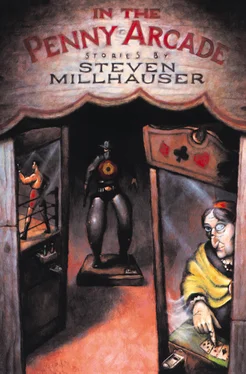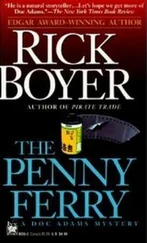Steven Millhauser
In the Penny Arcade
YOUNG ESCHENBURG
At the age of eight, August Eschenburg spent long summer afternoons playing with a cruel and marvelous toy. It had appeared suddenly one day in the field down by the river, and it was to disappear just as suddenly, in the manner of all delights which reveal themselves too quickly and too completely. A hollow paper figure represented a clown, or a fireman, or a bearded professor. When you put a captured bird inside, the poor creature’s desperate attempts at escape produced in the paper figure a series of wildly comic motions. August, who knew that the game was cruel, and who never told his father, tried more than once to keep away from the field by the river, but he always succumbed in the end. The other boys seemed to take pleasure in the struggles of the bird, but August was fascinated by the odd, funny grimaces of the tormented paper man, who suddenly seemed to come alive. This forbidden toy was far better than his music box with the slowly turning monkey on top, or his butter-churning maid who moved her arm up and down when you wound her up, or his windmill with sails that turned in a breeze. It was even better than his jointed yellow clown who all by himself could climb down the rungs of a little red ladder. August was relieved when school returned, and the cruel game in the field by the river disappeared as mysteriously as it had come, but he never forgot the sense of fear and wonder produced by those dangerously animated paper men.
He had always been fond of toys that moved, and for this love he considered his father in large part responsible. Joseph Eschenburg was a watchmaker by trade, and one of August’s earliest memories was of his grave, mustached father removing from his vest pocket a shiny round watch and quietly opening the back to display the mysterious, overlapping wheels moving within. August could not follow the patient explanation, but he realized for the first time that the moving hands of a watch did not just happen that way but were controlled by the complicated wheels hidden away inside. Not long afterward, when his father took him to the North Sea and he saw waves for the first time, he was hurt by his father’s gentle laugh when he asked whether the waves had wheels inside.
Young August was enchanted by the clocks and watches in his father’s shop. He liked to step out of the busy street where it was always a certain time and enter a world where it was many times together and therefore, in a way, no time at all. He liked to open the glass doors of clocks that came in cases and to set the pendulum swinging with a finger, and he liked to hold the heavy pocket watches in the palm of his hand and feel the secret mechanism beating inside like the heart of a bird. He liked the gleaming porcelain clocks with their carved Cupids and shepherdesses, and he liked the clock dials that had scenes painted on them: a sunlit glade with dancing knights and ladies, a Japanese woman with a very white face and a very red fan, children skating on a pond with their scarves streaming out behind them. But most of all he liked the secret wheels within, which made the hands turn at different speeds and which formed a far more complicated and beautiful pattern than the carvings and paintings on the outside. From an early age he had begun to help his father in simple ways, such as carefully cleaning the tiny mechanisms that lay scattered on the worktable under the hot light, and soon he was learning to perform the less difficult kinds of repair. He learned that the secret of the motion lay in the coiled spring, which when it lay alone on the table looked terribly helpless and awkward and reminded him somehow of a dead fish floating in the water. He learned how the spring in its hollow barrel was made to coil tight when you wound the watch, and how it slowly unwound to turn the gear train, with its three wheels each turning more rapidly than the one before. The second of these three wheels moved eight times as fast as the first, making one revolution in an hour, and the third made one revolution every minute. This wheel was in turn geared to the escape wheel, and August learned to take apart and assemble the section composed of the escape wheel, the forked lever with its two tiny jewels, and the balance wheel with its hairspring. All these things his father patiently taught him, scolding him only when he was especially clumsy, and the time came when August was able to take apart a watch, lay out its precious contents on the table, and put all the pieces back together again. It was far, far better than his colored wooden puzzle called Europe Dissected for the Instruction of Youth in Geography . He understood that the same mechanism which turned the watch hands also drove the little men and women who on certain clocks would step stiffly forward and turn their heads from side to side, but those simple figures were of far less interest to him than the complex wheels themselves. Even the butter-churning maid that his father took apart for him failed to do more than satisfy his curiosity, perhaps because the motions of the toy could not equal the double wonder of minute hand and hour hand smoothly performing their flawless motions. Those motions were perfect and complete in themselves, whereas the motions of the clockwork buttermaid were a very imperfect copy of human ones. Much later, when his life had developed in a way that felt like a destiny, August was to think it strange that never once during his childhood had he attempted to construct a clockwork figure of his own, as if his considerable skill as a watchmaker existed somehow apart from everything else, awaiting a certain fateful jolt before it revealed its inner meaning.
August’s mother had died when he was so young that he could scarcely remember her. Although his feeling for his mother was tender and reverent, she existed for him only in the little silhouette in the oval frame that his father kept on the night table beside his bed: a two-dimensional mother with a turned-up nose on one side and masses of curls on the other. For a while the boy had longed to penetrate that blackness, but later he was pleased that she had left behind only her shadow, as if his ardent, expansive feeling for her would have been unduly limited by too precise an image. But Joseph never forgave himself for failing to preserve his beloved Magda in a photograph — a mistake he was determined would not happen again. It was shortly after her death that the watchmaker first took little August to a photographer, and the child never ceased to marvel at the stern brown-and-white picture of himself in curls and knee-breeches, on a stiff cardboard backing. The new art of photography was scarcely a quarter of a century old, and much later, when the full meaning and destiny of the art were revealed to him, the early picture was to seem yet another fateful sign.
But far better than the cardboard photograph was the funny painting he saw one rainy Sunday afternoon in an obscure corner of the Stadtmuseum of a neighboring city, two hours by coach from Mühlenberg. He and his father had spent a long time admiring the splendid collection of clocks, the hall of doll-house miniatures, and the three rooms of early toys — wheeled horses from Berchtesgaden, flocks of lambs from Thüringen, goose-women from Sonneberg — and August had begun to grow tired when with a mysterious air his father led him into the room of pictures. Pictures in museums looked all the same to August, and he was disappointed and irritable as he looked about at the faded landscapes showing little people here and there, and sometimes dogs, and ships on the horizon.
Читать дальше












